vocabulary 词汇教学
《Vocabulary》课件
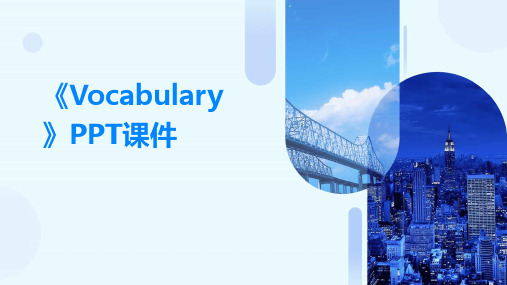
详细描述
英语学习APP或在线课程提供了便捷的学习 方式,学习者可以根据自己的时间安排进行 学习。这些平台通常拥有丰富的课程内容, 包括词汇、语法、听力和口语等方面的练习 。此外,许多平台还提供个性化学习体验, 根据学习者的学习情况和进度调整教学内容
,提高学习效果。
THANKS
感谢观看
02
CATALOGUE
词汇分类与构成
词汇分类
名词
表示事物名称的词,如 “apple”、“book”。
形容词
描述事物性质或状态的词 ,如“big”、 “beautiful”。
介词
表示事物之间关系的词, 如“in”、“on”。
动词
表示动作或行为的词,如 “run”、“write”。
副词
描述动作或状态的方式或 程度的词,如“quickly”
详细描述
将新学的词汇放入句子或段落中,通过理解 整个语境来加深对词汇的印象。这种方法有 助于理解词汇的用法和搭配,提高词汇的运 用能力。例如,在学习“vocabulary”时 ,可以将其放入句子“I need to improve my vocabulary”中,以更好地理解其含义 。
反复复习法
总结词
、“happily”。
连词
连接词句或从句的词,如 “and”、“but”。
词汇构成
01
02
03
简单词
由单一的词根构成的词, 如“dog”、“cat”。
派生词
由词根加上前缀或后缀构 成的词,如“unhappy” 、“happiness”。
复合词
由两个或多个词根构成的 词,如“bookcase”、 “blackboard”。
定期回顾已学过的词汇,通过反复巩固来加深记忆。
vocabulary词汇教案模板
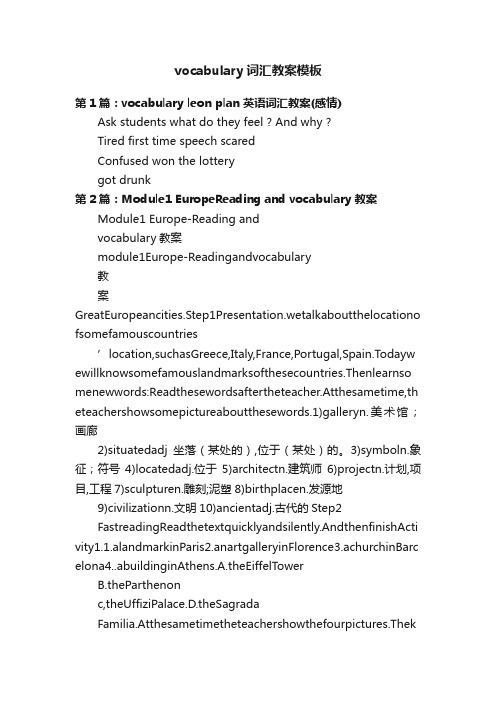
vocabulary词汇教案模板第1篇:vocabulary leon plan 英语词汇教案(感情)Ask students what do they feel ? And why ?Tired first time speech scaredConfused won the lotterygot drunk第2篇:Module1 EuropeReading and vocabulary教案Module1 Europe-Reading andvocabulary教案module1Europe-Readingandvocabulary教案GreatEuropeancities.Step1Presentation.wetalkaboutthelocationo fsomefamouscountries’location,suchasGreece,Italy,France,Portugal,Spain.Todayw ewillknowsomefamouslandmarksofthesecountries.Thenlearnso menewwords:Readthesewordsaftertheteacher.Atthesametime,th eteachershowsomepictureaboutthesewords.1)galleryn.美术馆;画廊2)situatedadj坐落(某处的),位于(某处)的。
3)symboln.象征;符号4)locatedadj.位于5)architectn.建筑师6)projectn.计划,项目,工程7)sculpturen.雕刻;泥塑8)birthplacen.发源地9)civilizationn.文明10)ancientadj.古代的Step2FastreadingReadthetextquicklyandsilently.AndthenfinishActi vity1.1.alandmarkinParis2.anartgalleryinFlorence3.achurchinBarc elona4..abuildinginAthens.A.theEiffelT owerB.theParthenonc,theUffiziPalace.D.theSagradaFamilia.Atthesametimetheteachershowthefourpictures.Thekey:1A2c3D4BStep3Afteractivity1andthengoontodoactivity2.matc hthewordsintheboxwiththeirdefinitions.ancientarchitectlandmarklocatesculpturewriter1.someonewhodesignsbuilding____________.2.tobeinacertainplace_____________.3.somethingthatiseasytorecognize,suchasabuil ding_____________4.someonewhoproducesnovelorpoems._________ _____5.alargebuildingwherepeoplecanseefamouspiecesofart.____ ___________6.theartofmakingthingsoutofstoneandwood,etc.______ _________7.ofatimelongago._____________Thekey:1.architect2.locat ndmark4.writer5.gallery6.sculpture7.ancientStep4readthepa ageandanswerthesequestions.1.whichofthecitiesarecapitalcities?2.whichoneiituatedonthecoast?3.whichisfamousforitsplacestoeat4.whichonesareorwereimportantcitiesforwritersandartists5.wh ichwastheworld’sgreatestcityalongtimeago?Thekey:1.AthensandParis2.Bar celona3.Paris4.ParisandAthens5.AthensStep5Decideifthesesente ncesaretrueorfalse1.TheEiffelTowerisatallbuildinginFrance.2.Ther earealotofrestaurantsandcafésinParis.3.BarcelonaisthecapitalofS pain.4.ThechurchoftheSagradaFamiliawasbuiltin1926.5.Theartisti cmovementcalledtheRenaiancebeganinFlorence.6.TheUffiziPalac eisafamoushotelinFlorence7.Therewerealotofgoodwritersinancie ntAthens.8.Alongtimeago,Athenswastheworld’smostpowerfulcity.Thekey:1.T2.T3.F4.F5.T6.F7.T8.TStep6m atchthedescriptionofeachcities.PairstheUffiziPalaceFamousbecauseoftheRenaianceTheParthenonGreece’sbestwritersandphilosophers.BarcelonaLeonardodaVinciandmichelangeloThesecondlargestcityofSp ainTheEiffelT owerFlorencetheRiverSeinethecapitalandlargestcityofFrancethechurchofSagradaFamiliaAthensaboutfivehundredkilometerseastofmadrid.Athens-------------theAcropolisStep7DiscuionIntroduceyourcityandtellyourcityland markandfamousbuilding.Step8Listentothetape.第3篇:Unit 1 Great Scientists vocabulary教案Unit 1 Great Scientistswords and expreionsby Li Yingying 【Teaching goals】:Learn the useful words& phrase: put forward;conclusion;attend;expose;challenge 【Ability aims】Let students have ability to use words and expreions in specific situation.【difficulties and Importance】Students can master skills to gue meaning of new words and expreions from context.【Teaching Procedures】StepⅠ.Greetings StepⅡ.Lead-in T: As all we know, vocabulary is the foundation of learning a language.And I think it’s also very important for us to learn English wellDo you agree with me? Ss:…T: Today I will share some words and a phrase with you.Let’s enjoy it.Step Ⅲ.Warming up Ask students to translate the following words and phrase.put forward conclusion attend expose challenge Step Ⅳ.teaching the usage of the expreions:1.put forward e.g.Stephen Hawking put forward a theory about black holes.λ(1)提出(+表示建议,计划等的名词)= come up with e.g.put forward a very good suggestion/plan λ(2)把…提前e.g.You are late, you should put your watch forward five minutes.λ(3)推荐e.g.We put Fu Wenli forward as our monitor.【归纳拓展】put awayput throughput output up put offput onput up with…put down(1).I had to ________the football match.(2).The fire has been __________.(3).Tom, please ________your shoes.λ2.conclusion n.结论;结束in conclusion 最后;总之draw/reach/come to/arrive at a/the conclusion 得出结论e.g.In conclusion, we draw a conclusionλ conclude vt.&vi.推断;决定,作结论;结束concl ude…from从……中推断出conclude…with…以……结束(某事)λ 3.attend vt. 出席,参加照顾 attend on sb.伺候某人,照顾某人attend to sth.处理;注意倾听,专心于;照料attend sth.参加(讲座、活动等)attend school/a lecture/church/a wedding 上学/听讲座/去教堂/参加婚礼λ attendance n.出勤率;出席人数 attendant adj.伴随的;伺候的【易混辨析】join加入(团体,组织,参军)join in 参加(某些小型活动)takepart in 参加(某些大型活动)attend参加(会议,课程,婚礼)(1).May I _______ your discuion?(2).He was ill so he didn't________ his claes.(3).His brother________ the army two years ago.(4).A lot of college students ____________sports meeting last year.λ 4.expose vt.暴露;揭露;使揭露λ(1)expose sb./sth.to sb./sth.暴露某人、某事物给某人、某事物λ(2)expose oneself to使自己面临危险;使自己暴露于λ(3)be exposed to遭受到expose...to使显露,使暴露λ expose crime/ scandal/ a plot/ a project/ a plan等揭露罪行﹑丑闻、阴谋﹑方案﹑计划等λ 5.challengeλ(1)n.挑战,难题face the challenge of 面对挑战accept the challenge 接受挑战e.g.He says he will ____ ____ ________ bravely.λ(2)vt.向…挑战质疑,怀疑(真实性)challenge sb.to sth.向某人挑战某事 challenge sb.to do sth.向某人挑战做某事e.g.She _________ ___ ___ ____ a tennis game.Step V.Consolidation Complete the sentences.1.哪个医生在护理你?Which doctor is ______ _______ you ? 2.别把皮肤暴露在阳光下,你会被晒伤的。
英语词汇课教学设计方案

I. IntroductionVocabulary is a fundamental component of language learning. A rich vocabulary allows learners to express themselves more effectively, understand complex texts, and communicate with greater ease. This teaching plan aims to design an engaging and effective vocabulary lesson for intermediate English learners, focusing on the acquisition of new words and phrases through various interactive activities.II. Objectives1. Knowledge Objectives:- Students will learn and recognize 20 new words and phrases related to a specific theme.- Students will understand the meanings and usage of the new vocabulary in different contexts.2. Skill Objectives:- Students will practice using the new vocabulary in sentences and conversations.- Students will develop strategies for memorizing and retaining new vocabulary.3. Attitude Objectives:- Students will develop a positive attitude towards learning new vocabulary.- Students will appreciate the importance of vocabulary in language proficiency.III. Lesson Duration1 hourIV. Materials- Whiteboard and markers- Vocabulary list with definitions and usage examples- Flashcards with the new vocabulary- Interactive whiteboard software (optional)- Handouts with exercises and activities- Writing materials (pens, pencils, paper)V. Lesson Procedure1. Warm-up (5 minutes)- Start the class with a brief review of the previous lesson's vocabulary.- Engage students in a quick discussion about the theme of the new vocabulary.2. Introduction to New Vocabulary (10 minutes)- Introduce the theme of the lesson and its relevance to thestudents' lives.- Present the new vocabulary words one by one, using the whiteboard and flashcards.- Provide definitions, usage examples, and context clues to help students understand the words.3. Interactive Activities (20 minutes)- Word Hunt: Divide the class into groups and give each group a handout with the new vocabulary. Students need to find the words in a text or picture related to the theme.- Vocabulary Bingo: Create bingo cards with the new vocabulary words. Students need to find the words in sentences provided by the teacher or their peers.- Word Sorting: Students sort the new vocabulary words into categories based on their meanings or usage.4. Practice and Application (15 minutes)- Sentence Building: Give students a list of sentences with blanks and ask them to fill in the blanks with the correct new vocabulary words.- Role-Playing: Students work in pairs or small groups to create a short dialogue or scene using the new vocabulary.5. Consolidation and Review (10 minutes)- Flashcard Review: Go through the new vocabulary words one by one, asking students to provide definitions and examples.- Vocabulary Game: Play a vocabulary game, such as "Concentration" or "Memory," to reinforce the new words.6. Homework Assignment (5 minutes)- Assign a homework task that requires students to use the new vocabulary in a creative way, such as writing a short story, journal entry, or creating a poster.VI. Assessment- Formative Assessment:- Observe students' participation and engagement during the lesson.- Monitor their ability to use the new vocabulary in context.- Collect and review homework assignments to assess understanding and application.- Summative Assessment:- Conduct a vocabulary quiz or test at the end of the unit to evaluate the students' overall retention of the new vocabulary.VII. ReflectionAs the teacher, reflect on the effectiveness of the lesson and identify areas for improvement. Consider the following questions:- How well did the students engage with the new vocabulary?- Did the activities and exercises promote active learning?- Were the learning objectives met?By continuously reflecting on and adapting teaching strategies, you can create a more effective and engaging vocabulary lesson for your students.。
第四单元Vocabulary公开课教案

第四单元Vocabulary公开课教案第四单元Vocabulary公开课教案[设计理念]新课程标准倡导:英语教学的目的是培养学生运用语言进行交际的.能力,为用而学,以任务为中心的任务型语言教学是目前交际教学思想中的一种新的发展形态。
在设计本节课时,在设计任务是,我把重点放在了创设情境,提高学生的口语表达上,让学生愿说、多说,善说。
[教材分析]学习有关人物特点的单词:tall, thin, short, heavy, calm, wild, long hair, short hair, outgoing, quiet, funny, serious, smart, athletic, etc形容词的比较级和最高[教学目标]1、谈论学生感兴趣的话题,指导学生学习有关人物特点的单词、人物比较的表达及语法知识点“形容词的比较级和最高级”。
2、培养学生的口头表达能力、阅读理解能力和写作能力。
[教学过程]Step 1 Lead-inT:I have a brother. Can you guess what he looks like and what he is like? (Show them the pictures.)S:He is tall. /he is heavy. / he has long hair./he is easygoing./…(Students use their imagination and express themselves freely.)T:Let’s look at our photos. Ple ase talk about us.S:He is taller than you. /He has shorter hair than you. /He is heavier than you. T:I’m more outgoing than my brother.[ 1、平时师生间接触多,但学生与老师的家人接触甚少,利用学生的心理和想象空间,调动学生的学习兴趣,增进师生间的相互了解。
Unit2-Vocabulary词汇教学设计2024-2025学年牛津深圳版英语七年级上册
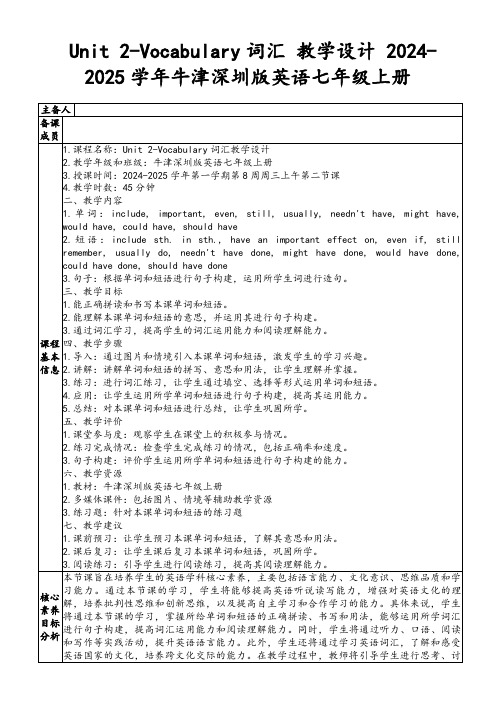
三、教学目标
1.能正确拼读和书写本课单词和短语。
2.能理解本课单词和短语的意思,并运用其进行句子构建。
3.通过词汇学习,提高学生的词汇运用能力和阅读理解能力。
四、教学步骤
1.导入:通过图片和情境引入本课单词和短语,激发学生的学习兴趣。
2.讲解:讲解单词和短语的拼写、意思和用法,让学生理解并掌握。
- 鼓励学生利用网络资源,如英语学习网站、在线英语词典等,进行自主学习和拓展学习。
- 组织学生进行英语角活动,让学生有机会在实际语境中运用所学词汇和短语,提高语言运用能力。
- 引导学生参加英语俱乐部或英语演讲比赛等活动,提高学生的英语综合运用能力。
- 鼓励学生阅读英语小说、杂志、报纸等,扩大词汇量,提高阅读理解能力。
- 定期组织英语语法讲座或辅导课程,帮助学生深入理解和掌握英语语法知识。
- 推荐学生使用英语学习APP,如Duolingo、Memrise等,进行词汇学习和练习。
- 让学生参加英语角活动,与其他学生进行交流和讨论,提高口语表达能力和跨文化交际能力。
教学资源拓展要求:
- 拓展资源要与本节课教学内容相关联,有助于学生的深入学习和发展。
4. 教学手段:
- 小组讨论
- 角色扮演
- 听力练习
- 口语练习
- 阅读练习
- 写作练习
5. 其他资源:
- 英语绘本
- 英语故事卡片
- 词汇游戏
- 学习手册
教学过程设计
1. 导入环节(5分钟)
- 教师通过展示一张图片或一个情境,引导学生思考并提问:“你们认为什么是重要的?”
- 学生发表自己的观点,教师总结并引出本课主题:“Today, we are going to learn about important things.”
vocabulary教学课件 (共39张PPT)

unit3 vocabulary
主讲人:罗萍 襄阳市田家炳中学
2015年11月25日
Unit 3
Vocabularies
Translate the following phrases.
1.直到现在 2.对...满足 3.穷的;缺少的 4.克服 5.挑出;辨别出 6.切断;断绝 7.无聊的 8.在…担任主角
切断电话线使某人通话中断
(3) He was cut off from all human contact.
使… 与外界隔绝
【即时对点练】
①I was speaking to Ann on the phone when
suddenly we were ___D_____.
A.hung up
B.hung back
be content with overcome cut off star in
Competition
• Divide the class into two groups .
• Make up sentences by using the new words and phrases we have just learnt.
He was _b_o_re_d_ with the _b_o_ri_n_g_ book.
8.star v. (在电影中)主演, 由……主演;
以……为主角 这位导演想让吉姆主演他的新片。 The director wants to star Jim in his new film.
她主演了许多好电影。 She has starred in a lot of good films.
feel/be content with sth (=feel/be satisfied with sth) 对某事感到满意/满足
Unit1 Vocabulary(教案(人教版必修三)

(高一)年级(英语)学科教学案授课班级:____ 姓名________ 课时__1-2____ 日期______设计者:高一年级组课题名称:_模块三Unit1 Festivals around the world(Vocabulary)教师寄语:No pains, no gains. 没有付出,没有收获.【自研课导学】自研内容及目标:1、鼓励学生自己先试着掌握新词汇读法,然后小组同学之间进行纠音;最后巩固词汇记忆2、在自学的过程中,若遇到自己不会读的单词,请做上记号。
课型设置:【自研·互动+ 展示】【展示课导学】(一)学习目标:通过本单元学习:1.能够使学生对本单元词汇形成正确的读音。
2.能够使学生对本单元重点词汇进行记忆与理解,并学会在练习中加以正确应用。
词汇讲评:1、celebration (n.) / celebrate (v.)/ celebrated (adj.)著名的/ celebrity (n) 名人;名声[辨析] celebrate / congratulatecelebrate sth. 庆祝某事have/ hold a celebration 举行庆祝会in celebration of 为了庆祝congratulate sb. on (doing) sth.祝贺某人做某事/ congratulations to sb. on (doing) sth.E.g. We celebrated New Year with a party.We congratulated him on having passed the examination.2、hunter / hunt / huntinghunt for = look for = in search of = search for3、starve / starvation / starvingstarve to death = be starved to death =die of starvation/hunger饿死starve for sth. = be starved of sth. = be dying for sth. = be eager for sth. =be anxious for = long for = be in great need of 渴望/迫切需要某物。
vocabulary tblt教学法

vocabulary tblt教学法Vocabulary TBLT教学法TBLT(Task-Based Language Teaching,基于任务的语言教学法)是一种以任务为核心的语言教学方法。
在这种教学法中,学生通过执行真实的任务来学习语言,这样能够提高他们的语言能力和交际能力。
Vocabulary TBLT教学法则是在TBLT的基础上特别针对词汇教学而设计的一种教学方法。
Vocabulary TBLT教学法的核心理念是通过真实的任务来帮助学生掌握和应用新的词汇。
这种教学法充分考虑到学生的学习需求和兴趣,通过提供有意义的任务来激发学生的学习动机。
以下是Vocabulary TBLT教学法的一些关键要点。
1. 任务设计:任务应该有明确的目标,能够激发学生的兴趣,并且与学生的实际生活和学习经验相关。
任务可以是真实场景中的沟通活动,如讨论旅行计划、写电子邮件等。
通过执行任务,学生能够在实践中使用新的词汇。
2. 词汇选择:教师在设计任务时应选择与学生学习目标相关的词汇。
这些词汇应该是学生在实际交际中常用的词汇,能够帮助学生提高他们的交际能力。
3. 词汇教学:在执行任务之前,教师可以通过一些课堂活动来教授新的词汇。
这些活动可以包括词汇练习、词汇游戏和词汇拓展等。
教师可以使用不同的教学资源,如课本、词汇卡片和多媒体材料,以帮助学生掌握新的词汇。
4. 任务执行:在执行任务时,学生应使用他们学习到的词汇来完成任务。
教师可以提供必要的支持和指导,鼓励学生主动运用词汇进行交流。
学生可以在小组或整个班级的合作中完成任务,这样能够增加他们的互动和合作能力。
5. 反馈和评估:在任务完成后,教师应给予学生及时的反馈。
这可以是口头反馈,如对学生的表现进行评价和指导;也可以是书面反馈,如批改学生的作业。
教师还可以通过课堂讨论和小组分享的方式让学生互相评价和反馈。
Vocabulary TBLT教学法的优势在于它能够将语言学习与实际应用结合起来,帮助学生更好地掌握和运用新的词汇。
teaching-vocabulary-词汇教学
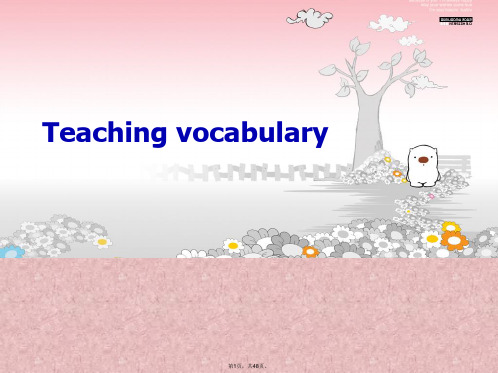
called?
Column A
Column B
(1)________ (2)________ (3)________ (4)________ (5)________ (6)________ (7)________ (8)________ (9)________
a. brood b. flock c. band d. colony e. swarm f. gaggle g. pride h. herd i. school
(2) Think of three or four typical collocations in
English, and try translating them into Chinese. Do the collocations translate exactly? If not, what kinds of learning/teaching problems might this lead to, and what might you do about it?
第13页,共48页。
What a student may need to know ?
1. Item-----What it means
2. The form 3. How it is pronounced
4. How it is spelt
5. The connotations that the item may have 6. The situations when the word is or is not used 7. How the word is related to others 8. Collocation or the way that words occur together 9. What the affixes may indicate about the meaning?
(PEP)三年级上册小学英语《Vocabulary》教学设计_3
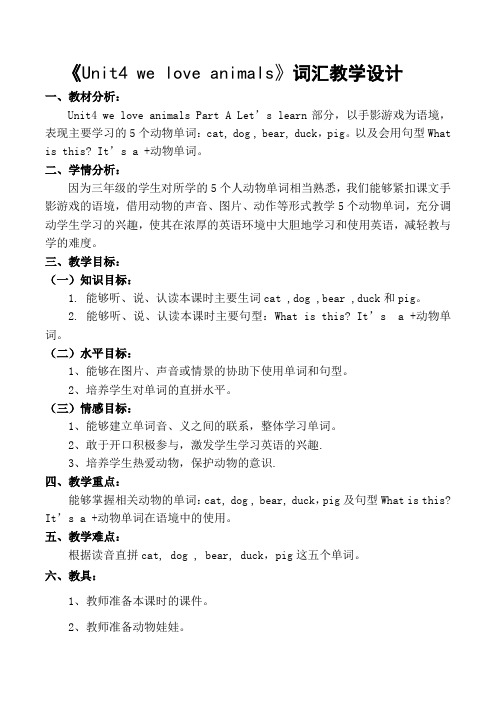
《Unit4 we love animals》词汇教学设计一、教材分析:Unit4 we love animals Part A Let’s learn部分,以手影游戏为语境,表现主要学习的5个动物单词:cat, dog , bear, duck,pig。
以及会用句型What is this? I t’s a +动物单词。
二、学情分析:因为三年级的学生对所学的5个人动物单词相当熟悉,我们能够紧扣课文手影游戏的语境,借用动物的声音、图片、动作等形式教学5个动物单词,充分调动学生学习的兴趣,使其在浓厚的英语环境中大胆地学习和使用英语,减轻教与学的难度。
三、教学目标:(一)知识目标:1. 能够听、说、认读本课时主要生词cat ,dog ,bear ,duck和pig。
2. 能够听、说、认读本课时主要句型:What is this? It’s a +动物单词。
(二)水平目标:1、能够在图片、声音或情景的协助下使用单词和句型。
2、培养学生对单词的直拼水平。
(三)情感目标:1、能够建立单词音、义之间的联系,整体学习单词。
2、敢于开口积极参与,激发学生学习英语的兴趣.3、培养学生热爱动物,保护动物的意识.四、教学重点:能够掌握相关动物的单词:cat, dog , bear, duck,pig及句型What is this? It’s a +动物单词在语境中的使用。
五、教学难点:根据读音直拼cat, dog , bear, duck,pig这五个单词。
六、教具:1、教师准备本课时的课件。
2、教师准备动物娃娃。
七、教学过程:(一)、Preparation:1、Greetings(师生问好)2、Let’s sing together:Hello!(二)、Presentation:1、Let’s learn听音猜动物,学习本课时生词:Presentation of pig. Pig, a pig ,it’s a pig.根据学生已经掌握的常见的辅音字母p发/p/的音,字母g发/g/的音,学习元音字母i的常见发音/i/,组织学生试读。
冀教2011版四年级英语上册《Vocabulary》教案及教学反思
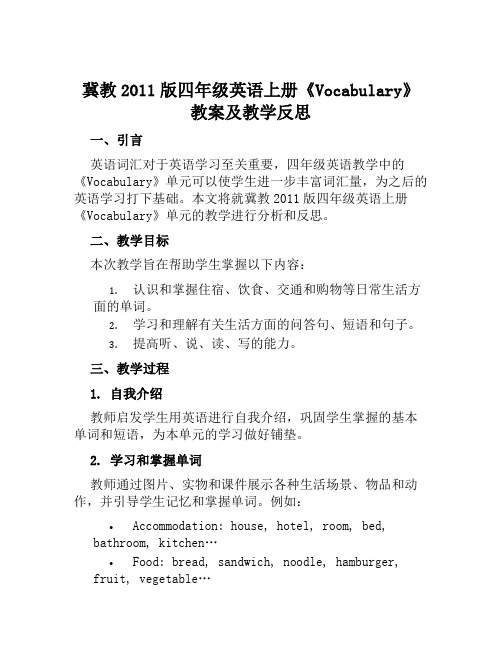
冀教2011版四年级英语上册《Vocabulary》教案及教学反思一、引言英语词汇对于英语学习至关重要,四年级英语教学中的《Vocabulary》单元可以使学生进一步丰富词汇量,为之后的英语学习打下基础。
本文将就冀教2011版四年级英语上册《Vocabulary》单元的教学进行分析和反思。
二、教学目标本次教学旨在帮助学生掌握以下内容:1.认识和掌握住宿、饮食、交通和购物等日常生活方面的单词。
2.学习和理解有关生活方面的问答句、短语和句子。
3.提高听、说、读、写的能力。
三、教学过程1. 自我介绍教师启发学生用英语进行自我介绍,巩固学生掌握的基本单词和短语,为本单元的学习做好铺垫。
2. 学习和掌握单词教师通过图片、实物和课件展示各种生活场景、物品和动作,并引导学生记忆和掌握单词。
例如:•Accommodation: house, hotel, room, bed, bathroom, kitchen…•Food: bread, sandwich, noodle, hamburger, fruit, vegetable…•Transportation: car, bus, trn, bicycle, rplane, boat…•Shopping: supermarket, money, price, sale, clothes…3. 学习和理解句子教师以问答的形式呈现句子,让学生理解和掌握对话中的用语和句式,并帮助学生加强口语练习。
例如:•A: Where do you live?•B: I live in a house.•A: What do you eat for breakfast?•B: I eat bread and milk.•A: How do you go to school?•B: I go to school by bus.•A: How much is this T-shirt?•B: It’s ten yuan.4. 进行语言输出活动教师设计一些听、说、读、写的活动,鼓励学生用英语表达、交流和合作。
- 1、下载文档前请自行甄别文档内容的完整性,平台不提供额外的编辑、内容补充、找答案等附加服务。
- 2、"仅部分预览"的文档,不可在线预览部分如存在完整性等问题,可反馈申请退款(可完整预览的文档不适用该条件!)。
- 3、如文档侵犯您的权益,请联系客服反馈,我们会尽快为您处理(人工客服工作时间:9:00-18:30)。
↓↓
Principle 1: provide opportunities for the incidental learning of vocabulary
2.1 Incidental Learning
Advantages: ①build up the students' vocabulary and structures until they can graduate to more authentic materials. ②Low-proficiency learner can benefit from graded readers because they will be repeatedly exposed to high-frequency vocabulary. ③(my opinion)It puts the vocabulary in certain context, which is better for the learner to understant the partial meaning(meaning in the context) of the word and better for the future production(used in the real situation).
— principle 3
elaborating word knowledge
— principle 4
developing fluency with known words
— principle 5
Principle 2: diagnose which of the 3000 most common words learners need to study (3000 high-frequency and general academic words)
Current Research and Practice in Teaching Vocabulary
Alan Hunt and David Beglar
Contents
1. Introduction 2. Three Approaches (seven principles) and
Comments 3. Conclusion
Principle 3: provide opportunities for the intentional
learning of vocabulary
The first stage in teaching 3000 most frequent words commonly begins with word pairs in which a L2 word is matched with L1 translation.(e.g., desk--书桌,bird--鸟)
Knowing a word means knowing more than just its translated meaning or its L2 synonyms.
Nation(1994) identifies various aspect of word knowledge, such as knowing related grammatical patterns, affixes, common lexical sets, typical association, how to use the word receptively and productively, and so on.
Principle 5: provide opportunities for developing fluency with known vocabulary
Fluency -building activities recycle already know words in familiar grammtical and organizational patterns so that students can focus on recognizing or using words without hesitation.
1. Introduction
Vocabulary learning is more than the study of individual words. We also should focus on lexical phrases, which range from phrasal verbs (two or threes words) to longer institutionalized expressions(Lewis, 1993, 1997).
2020/3/2
2.1 Incidental Learning
Problems:①词汇量要求:通过阅读附带习得词汇不是任何外语 水平的学习者都可以做到的,因为它对阅读者有个最低词汇量 的要求(杨静,2013)。To guess successfully from context, learners need to know about 19 out of every 20 words(95%) of a text, which requires knowing the 3000 most common words(Liu & Nation,1985; Nation, 1990).
2020/3/2
2.3 Independent Strategy Development
Principle 6: experiment with guessing from context Principle 6 coincides in part with the incidental learning. They share the same advantages and disadvantages.
2. Three Approaches
2.1 Incidental Learning (附带习得/间接学习) 2.2 Explicit Learning(刻意学习/直接学习) 2.3 Independent Strategy Development(自主学习能
力培养)
2020/3/2
2.1 Incidental Learning
②语境及词义猜测:有些阅读者自认为认知而实际上不认识的 单词在很大程度上也会妨碍在阅读中对陌生词的词义的正确推 测(杨静,2013)。“错误的猜测比正确的和接近的猜测更为 常见”(Bensoussan,1984) ③词汇习得的效果:If learners read in familiar areas where they bring a lot of relevant background knowlege to their reading , they will easily cope with unknown words in context, but they will probably not learn them.(Nagy,Herman, & Anderson, 1985)
Effective way to quickly learn word-pair translations: vocabulary lists, vocubulary cards.
Principle 4: provide opportunities for elaborating word knowStrategy Development
Advantages: ①build up the students' vocabulary and structures until they can graduate to more authentic materials. ②Low-proficiency learner can benefit from graded readers because they will be repeatedly exposed to high-frequency vocabulary. ③(my point)It puts the vocabulary in certain context, which is better for the learner to understant the partial meaning(meaning in the context) of the word and better for the future production(used in the real situation).
♦词汇附带习得是学生在进行诸如阅读文章,交流, 听英文歌曲等学习活动时,附带习得了单词。
Incidental learning of vocabulary requires that teachers provide opportunities for extensive reading and listening.
2020/3/2
2.2 Explicit Learning
学生刻意地背记单词,如通过背单词表或做词汇练习来 记忆单词。
diagnosing the words learners need to know — principle 2
presenting words for the first time
Coady(1997) calls this the beginner's paradox. He wonders how beginners can “ learn enough words to learn vocabulary through extensive reading when they do not know enough words to read well.” (cover the shortage of incidental learning) Prolems: (my points)①Learn vocabulary out of the context. The new words for the learners are hard to remember or use correctly in certain context. ②The process maybe boring. It's hard to raise the learner's learning interests.
